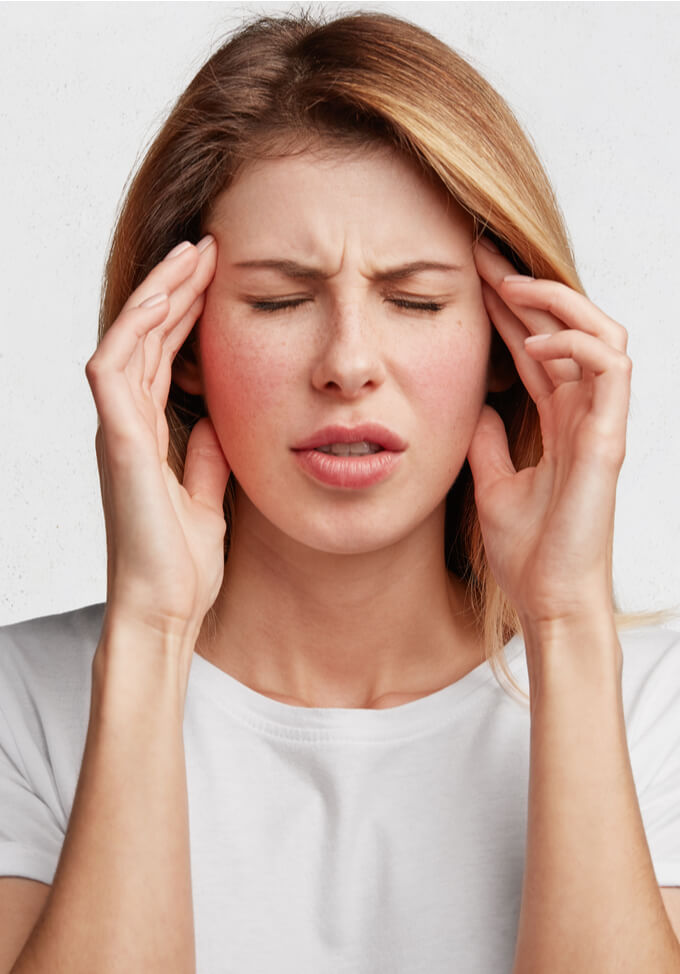
Chronic Daily Headaches (CDH)
What Causes Chronic Daily Headaches?
Chronic daily headache (CDH) is a state of being rather than an actual diagnosis. The definition of chronic daily headache is a headache that occurs over half of the time, or at least 15 days each month.
CDH can occur from migraine headaches, tension headaches, cluster headaches or even a combination of different types of headaches. Patients with chronic daily headaches may live with head pain at all times, with varying degrees of intensity and varying degrees of debility arising from their headaches.

Who Is a Candidate for Chronic Headache Treatment?
We all have occasional headaches. They don’t require the help of Dr. Lowenstein or any other health professional. But chronic headaches are another thing altogether.
If the following characteristics sound like you, you may benefit from coming to see Dr. Lowenstein at the Migraine Surgery Specialty Center for help.
Call us if:
- You typically have two or more headaches every week
- You take a pain reliever for your headaches most days
- It requires more than the recommended dose of over-the-counter pain medication to relieve your pain
- Your headache pattern changes
- Your headaches become worse
- Your headaches are disabling
While the above characteristics or symptoms are not life-threatening and don’t require immediate treatment, there are certain times when a person requires immediate medical care, and in these cases you should call 911:
- If your headache is sudden and severe
- If your headache accompanies a fever, stiff neck, confusion, seizure, double vision, weakness, numbness or difficulty speaking
- If your headache follows a head injury
- If your headache worsens despite rest and pain medication
Headache 360 Podcast
Be sure to check out Dr. Lowenstein’s podcast for all the information you need regarding chronic daily headaches and migraines. You can access the podcast by clicking the link!
If you are suffering from chronic daily headaches, give Dr. Lowenstein a call at 805-969-9004.
FAQs
What Are the Symptoms of Chronic Daily Headaches?
Nausea, dizziness, photophobia and other problems may accompany CDH. Many chronic headache patients find relief from their symptoms with headache surgery, which reduces irritation and inflammation of specific nerves.
When Should I See a Neurologist for My Chronic Daily Headaches?
Chronic daily headaches can be debilitating. Patients should see a doctor for a comprehensive consultation and examination in the following situations:
- Headaches occur two or more times a week
- Pain reliever is needed nearly every day to control headaches
- The recommended dose of over-the-counter pain medication is not sufficient to reduce pain
- Headaches worsen or change in pattern
- Headaches minimize the ability to work or engage in normal activities
Are There Medications I Can Take for Chronic Daily Headaches?
Several medications have been used to treat patients with frequent headaches. These include:
- Prescription-strength nonsteroidal anti-inflammatory drugs (NSAIDs) may help relieve pain for some patients
- Tricyclic antidepressants may help to reduce headache pain, as well as the sleep disturbances, anxiety and depression that may accompany them
- Anti-seizure drugs have been shown to reduce chronic daily headaches and migraines in some patients
- Beta-blockers, which are commonly prescribed to reduce high blood pressure, may be effective at managing episodic migraines
- Botox and other botulinum toxin neuromodulators have recently become a popular method of treating headaches
What Chronic Daily Headache Treatments Are Available?
Non-pharmacological treatment methods may be more appealing to some people than prescription drugs to manage chronic daily headaches. These options include acupuncture and massage. Both can provide relief from muscle tension and stress but may have a limited impact on moderate to severe headaches.
Patients who visit our Santa Barbara office can explore the benefits of migraine surgery as a treatment option for chronic daily headaches. Dr. Lowenstein performs precise testing to determine if inflammation of a peripheral nerve is contributing to chronic pain. Peripheral nerve pain is a common factor in migraines as well as other types of headaches. Surgery relieves pressure on the affected nerve and thus reduces or eliminates pain.
Is There Recovery After Chronic Headache Treatment?
If non-invasive treatments are not solving the patient’s chronic headaches, peripheral nerve surgery could be necessary to relieve the nerve compression that is causing the problem.
If this is the treatment used, there will be one to three weeks of recovery time. Over this period, the patient needs to avoid any activities that raise blood pressure, especially in the face and head. The key to recovery after peripheral nerve release is to lay low and relax.
Do Chronic Daily Headaches Go Away Without Treatment?
Usually, when a person’s headaches have progressed from occasional headaches to chronic headaches, something has changed their health or lifestyle. For that reason, once headaches occur at least 15 days out of every month, they are unlikely to resolve without treatment from a headache specialist like Dr. Lowenstein.
People assume they can manage their chronic headaches. They often assume this is a phase in life—maybe more stress, maybe less sleep—and things will change. In the meantime, their headaches are directly impacting their quality of life.
This isn’t something that changes or goes away. Your chronic headaches need to be treated by an expert.
What Happens If I Don't Treat My Chronic Headaches?
It’s unlikely that these headaches are suddenly going to go away. After all, they’ve progressed from being an occasional problem to impacting at least half of the days of the month. No doubt your headaches have begun to affect your relationships, work and most other areas of your life. If treatment by your doctor or neurologist is unable to provide pain control, you might feel that further pursuit of relief is impossible, but that is not the case.
Why let that continue?
Dr. Lowenstein is a board-certified plastic surgeon with extensive specialized training and education with migraines and chronic headaches that are resistant to medications and other treatments. Helping patients get past the chronic pain associated with these headaches has become a large part of our practice.
While you can opt to go it alone and suffer through these near-daily headaches, it makes far more sense to seek the help of Dr. Lowenstein for treatment.
If I Have Treatment for My Chronic Headaches, Will I Need Treatment Again in the Future?
Nerve decompression surgery usually provides permanent relief. While it may not stop all of your headaches, their frequency and intensity should drop. Around 40 percent of our migraine surgery patients become completely free of pain.
Other non-surgical treatments may or may not need repeating in the future. Every patient’s situation is different.
How Can I Avoid Chronic Daily Headaches?
Several strategies may help ease chronic daily headaches. These include:
- Identify and avoid triggers. To do this, you may have to keep a headache diary and note when headaches occur and what happened beforehand, such as what foods were consumed. Caffeine is one example of a trigger.
- Get sufficient sleep. Studies suggest that insufficient sleep (less than 7 ½ hours) may contribute to headaches. Poor sleep could be caused by a condition such as sleep apnea, which could also trigger headaches.
- Eat regularly. According to some studies, skipping meals could lead to headaches.
- Exercise regularly. This reduces stress and promotes good circulation throughout the body.
- Manage stress. Stress leads to the release of certain hormones, as well as chronic muscle tension, both of which could cause headaches.
- Avoid medication overuse. Taking headache medications more than a few times a week could increase the frequency and severity of headaches.
Strategies to avoid chronic daily headaches may not work for everyone. If headaches continue, it is important to seek medical care. Your family doctor or a neurologist can help develop an appropriate treatment plan. If medications or lifestyle changes are unable to control your headache pain, Dr. Lowenstein can provide testing to see if you are a candidate for nerve decompression surgery, and to see if you are potentially one of those who can expect a better than 90% chance of finding headache pain relief.
